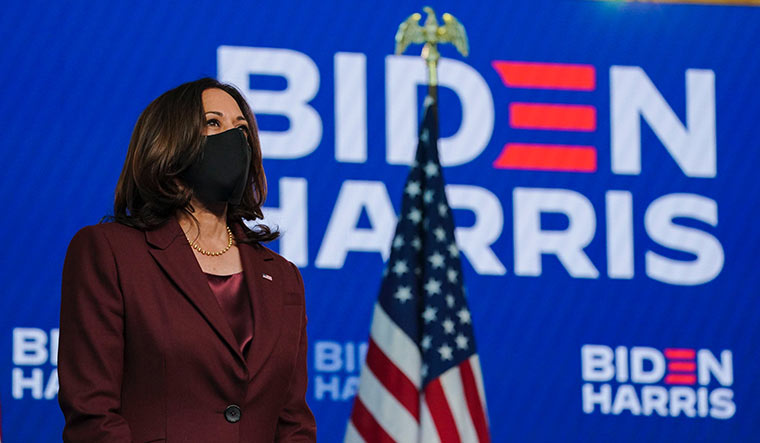An Indian woman, half-Black, the daughter of a woman from Chennai, stood in front of the world today and rose to her fate as a giant figure in the great scheme of life. At precisely 18 minutes before noon January 20, 2021, Kamala Harris became the first woman vice-president of the United States, evoking history and fate, and a rich potential beyond most people’s wildest dreams. She takes on the role at one of America’s most turbulent times, perhaps to become the world’s most consequential Indian since Mahatma Gandhi.
Of course, she is all-American, but through chance, destiny, or happenstance, she is both sides of a global coin, currency in a global set of transactions that will chart the course of humanity as determined by actions on behalf of the most powerful nation on Earth.
Never before has a woman or a South Indian occupied a position of such consequence—from the trenches of a fight against a global pandemic where her country is by far the worst-affected and worst-prepared, to the economic effects, to the human desperation, to the lives of people all over the world, in decisions that will determine just what kind of lives we will be able to lead.
“When she takes the oath of office little girls and little boys across the world will know that anything is possible,” said Sen. Amy Klobuchar, chair of the Joint congressional committee on the Inauguration, referring to the historical moment represented by the Harris swearing-in.
Harris walked to the ceremony through the very same marble halls that were attacked by pro-Trump mobs trying to stop the certification of results from the election just two weeks ago. She walked in holding hands with her husband, America’s first Second Gentleman, Doug Emhoff.
Capitol Police Officer Eugene Goodman, a veteran police officer who single-handedly delayed the angry insurgents from reaching the chambers where lawmakers were meeting, giving time for vice-president Mike Pence to be escorted to safety, was tapped to escort the new vice-president. Goodman is now the acting deputy Seargent-at-Arms in the House
Harris was dressed in purple, the colour of suffragette loyalty, in a nod to Shirley Chisholm, the first woman and African American to seek the nomination for president in a major political party in 1972.
After an invocation by Jesuit Father Leo O’Donovan friend of President-to-be Biden, the presentation of the colours was done to the same music played during the inauguration of George Washington 232 years ago.
A radiant Lady Gaga then sang the strains of the national anthem. Georgia firefighter Andrea Hall then led the crowd in voice and in sign language on the Pledge of Allegiance to the flag.
At 11:41am, a smiling Harris stepped up across from Supreme Court Judge Sonya Sotomayor, raised her right hand, her left hand on the Bible that belonged to the first African American member of the US Supreme Court, Thurgood Marshall, and took the oath of office, “I, Kamala Devi Harris, do solemnly swear that I will support and defend the Constitution of the United States against all enemies, foreign and domestic; that I will bear true faith and allegiance to the same; that I take this obligation freely, without any mental reservation or purpose of evasion; and that I will well and faithfully discharge the duties of the office on which I am about to enter: So help me God.”
It's an honor to be your Vice President. pic.twitter.com/iM3BxJzz6E
— Vice President Kamala Harris (@VP) January 20, 2021
As she spoke those words Harris became serious and it was almost possible to see the weight of the moment descending upon her. A stare of a thousand yards looked over the crowd that included former presidents Clinton, Bush, and Obama, and the now-former vice-president Mike Pence.
Harris hugged her husband, fist-bumped Biden, walked by as Pence applauded, and took her place in history.
Ten minutes later, Joseph R. Biden, having been sworn by Chief Justice Roberts with his hand on a 127-year-old family Bible, was introduced as the 46th President of the United States.
He began his address by addressing Vice-President Kamala Harris.
The moment was no small moment. It was a marked change in the path of the history of a nation. Harris, who was the tenth Black person to serve in the U.S. Senate and only the second Black woman, was now the country’s second most powerful person, the first person of colour to hold that post. Her husband, America’s first Second Gentleman became the first Jewish spouse of a vice president.
Looking forward to the moment of her swearing-in, Harris said in a recent NPR interview, “I will be thinking about my mother, who’s looking down from heaven. I will be thinking of all the people who are counting on us to lead.”
“My mother instilled in my sister, Maya, and me the values that would chart the course of our lives,” Harris said in a speech during the campaign. “She raised us to be proud, strong Black women. And she raised us to know and be proud of our Indian heritage.”
In a Washington shut down by barricades, fencing, concrete barriers, and barbed wire and still resounding the words of outgoing Secretary of State Mike Pompeo using the currency of racism to gain traction in which he said multiculturalism was anti-American Harris stood as the very image of American multiculturalism itself, a woman incorporating both sides of her public persona, her Black identity, and her Indian descent — e Pluribus Unum.
In speeches, Harris often quotes her mother, Shyamala Gopalan Harris, telling her, “You may be the first to do many things, but make sure you are not the last.”
Today marked one impressive first in the pages of history.





